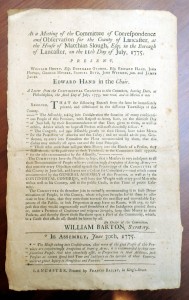 Lehigh University professor Scott Gordon found what he believes to be the only copy left in existence of a Revolutionary War broadside in the Lititz Moravian Church Archives and Museum in Lancaster County, Pennsylvania. Broadsides were printed posters hung in public places or read aloud to get the word out in the days before mass media.
Lehigh University professor Scott Gordon found what he believes to be the only copy left in existence of a Revolutionary War broadside in the Lititz Moravian Church Archives and Museum in Lancaster County, Pennsylvania. Broadsides were printed posters hung in public places or read aloud to get the word out in the days before mass media.
This particular one was published on July 11, 1775, by the Committee of Correspondence and Observation for the County of Lancaster on behalf of the Continental Congress. It was an appeal to people who had religious objections to volunteering to taking up arms against the British that they might instead contribute money to the war effort. At least 200 copies were printed, some in English, some in German. According to the Professor Gordon’s extensive research, this is the only surviving English copy, and the only surviving intact copy. The Library of Congress has a fragment of the German version.
There were a great many German immigrants in Lancaster County. The town of Lititz, where the broadside is on display, was founded in the 1740s as a closed Moravian Church community. The Moravian denomination was pacifist (which didn’t stop William Henry, Esq., the first committee member listed on the broadside, from becoming a very successful gunsmith), as were other Christian denominations prevalent among people of German extraction, like the Amish and Anabaptists. The broadside basically goads these conscientious objectors to give money, strongly implying that their pacifism might be seen as a cover for stinginess rather than a dearly held principle.
The Committee do therefore join in earnestly recommending it to such Denominations of People, in this County, whose religious Scruples forbid them to associate or bear Arms, that they contribute towards the necessary and unavoidable Expences of the Public, in such Proportion as may leave no Room, with any, to suspect that they would ungenerously avail themselves of the Indulgence granted them; or, under a Pretence of Conscience and religious Scruples, keep their Money in their Pockets, and thereby throw those Burthens upon a Part of the Community, which, in a Cause that affects all, should be borne by all.
The broadside has been on display at the Lititz Moravian Church museum since at least the 1970s; it’s just that nobody realized it was so rare as to be one-of-a-kind. Dorothy Earhart has been giving tours at the museum since the 1960s and she thinks the paper has probably been kept at the church ever since the minister received it from the committee in 1775. He would have read the German translation aloud to his congregation and passed it around. Earhart thinks that since the German-speaking congregants had little use for the English version, the minister just filed it away and forgot about it.
The message “is of special significance to us as Moravians, as noncombatants,” [Earhart] added. “It’s very special to our community … and it’s kind of neat to have the only surviving copy.”
Moravians supported the Continental Army — “not the war, the army,” Earhart stressed — with food, clothes and medicine. In fact, another document in the showcase is a copy of a letter from Washington to Moravian Bishop John Ettwein regarding a military hospital in Lititz.
The museum will keep the broadside on display. It’s in excellent condition so whatever they’ve been doing for the past 236 years they just need to keep doing.